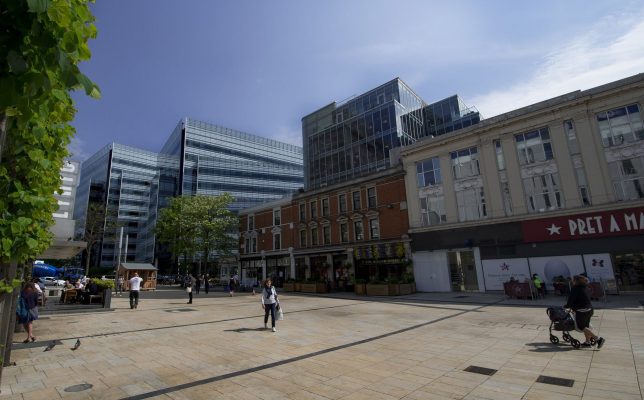What is Flexible Office Space?
Why Flexible Office Space Makes Sense
Flexible office space is a growing trend redefining how businesses, freelancers, and organisations work. These are office environments designed to be versatile, providing the necessary work infrastructure but allowing companies to adapt the space to their needs. Unlike traditional offices with long-term leases and static setups, flexible office spaces cater to the dynamic nature of modern businesses, offering adaptable solutions for growth, scaling down, or temporary work arrangements.
Definition of Flex Office Space
What Makes an Office Space “Flexible”?
A flex office space can offer lease agreements, layout, and service flexibility. Businesses that use flexible spaces aren’t locked into long-term contracts or fixed designs. Instead, they rent spaces for shorter periods, often month-to-month, and adjust the office setup to match their team size and operational needs.
Differences Between Flexible Office Spaces and Traditional Offices
The most significant distinction between flexible and traditional offices is their adaptability. Traditional offices often require long-term lease commitments, usually five to ten years. In contrast, flexible spaces offer more versatile options, allowing companies to choose short-term leases, fully furnished workspaces, and additional services like reception, cleaning, and IT support without the hefty investment of setting everything up from scratch.
Types of Flexible Office Spaces
| Title | Description | Move-in Time |
|---|---|---|
| Coworking Spaces (Memberships) | Coworking spaces are communal environments where individuals and small teams can rent a desk or office space within a shared office. These spaces foster collaboration, networking, and creativity by allowing professionals from different industries to work under one roof. | After contract completion |
| Serviced Offices | Serviced offices are private offices within a larger complex, fully managed by an office provider. These spaces come with all-inclusive services like internet, furniture, reception services, and maintenance, offering a turnkey solution for businesses that need a professional environment without the hassle of handling logistics. | 1–4 weeks (Allocation for build) |
| Managed Office | Fully customised usually by floor. Halfway solution between a serviced office and a leasehold office. Services selected to suit with tailored delivery. SDLT and rates are not always included. Limited on expansion, retraction & no communal space. | 4–16 weeks (Allocation for build) |
Key Features of Flexible Office Spaces
Short-Term Lease Agreements
The most appealing feature of flexible office spaces is the short-term lease agreements. Depending on their needs, companies can rent offices for as little as a few weeks or as long as a couple of years. This is particularly useful for growing businesses that may need to scale their space requirements up or down.
Customisable Layouts
Flexible offices offer many layouts, from open-plan coworking spaces to private offices. Many flexible office providers allow companies to reconfigure spaces to suit their working style, whether it’s collaborative workstations or quiet, individual offices.
Fully Furnished Spaces
Most flexible office spaces come fully furnished, so companies don’t have to invest in furniture, technology, or office decor. This makes moving in and out much easier and more cost-effective.
Benefits of Flexible Office Space
Cost-Effectiveness
One of the biggest advantages of flexible office spaces is their cost-saving potential. With no upfront investment in furniture, utilities, or long-term leases, businesses, especially startups or small businesses with limited capital, can allocate their budget more efficiently.
Adaptability and Scalability
Companies experiencing rapid growth or fluctuations in team size benefit significantly from flexible office spaces. These spaces allow businesses to scale up when hiring more staff or downsize when necessary without the hassle of breaking a lease.
Networking Opportunities
Being in a flexible office space, especially in coworking environments, opens the door to valuable networking opportunities. Businesses can collaborate, share knowledge, and potentially form partnerships with other tenants in the space.
The Rise of Flexible Office Spaces Globally
Growing Demand for Flexibility
In recent years, the demand for flexible office space has surged. More businesses are realising the benefits of adaptable workspaces, and as work cultures shift toward remote and hybrid models, the need for flexibility is only increasing.
Post-Pandemic Shift in Work Culture
The COVID-19 pandemic changed the way everyone works. Companies were forced to embrace remote working, and flexible office spaces provided a solution for those looking to maintain an office presence without the burden of traditional office costs.
Startups and SMEs Leading the Way
Startups and small-to-medium-sized enterprises (SMEs) are often the early adopters of flexible office solutions. These businesses require agility in their operations, making the scalability and cost savings of flexible offices an ideal choice.
Who Should Consider Flexible Office Space?
Startups and Entrepreneurs
Flexible office spaces offer startups the chance to scale at their own pace without long-term commitments. Entrepreneurs can benefit from the low entry costs and networking opportunities within these spaces.
Remote Workers
Remote workers who seek a professional environment outside their home often turn to flexible offices. Coworking spaces, in particular, offer a social aspect that remote workers might miss.
Large Corporations Looking to Downsize
Even large corporations are exploring flexible offices. By downsizing their traditional office space and adopting flexible work policies, they can save on costs while offering employees more choices in how they work.
Challenges of Flexible Office Spaces
Lack of Personalisation
One challenge of flexible office spaces is the limited ability to personalise the environment fully. While you can customise layouts, a flexible office might feel more personal and branded than a traditional office.
Potential for Overcrowding
In popular flexible offices, space can sometimes feel crowded, especially during peak times. Businesses need to evaluate whether the office can comfortably accommodate their team.
Security Concerns
Shared spaces can raise concerns about data security, especially for businesses that handle sensitive information. It is crucial to ensure that the flexible office provider offers robust security measures.
Flexible Office Space vs. Remote Working
Pros and Cons of Flexible Offices
Flexible offices provide a structured work environment, networking opportunities, and professional services. However, they may not offer the same freedom as remote work and may involve commuting.
Pros and Cons of Remote Work
Remote work offers unparalleled flexibility and eliminates the commute, but it can lead to feelings of isolation and less collaboration with colleagues.
How to Choose the Right Flexible Office Space
Location and Accessibility
Location is key. Make sure the office space is easily accessible for your team and clients.
Budget and Pricing Plans
Evaluate the pricing structure. Look for spaces that offer transparency and all-inclusive.
At Cushman & Wakefield, we’ll bend over backwards to find you the perfect office space. Speak to our team on 0203 296 2573



